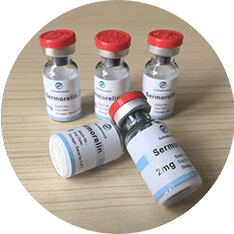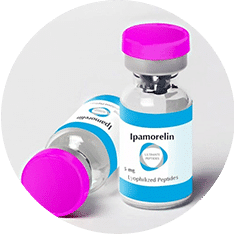
Unlock a More Youthful You With Hormone Replacemment Therapy In Lincoln Park, NJ
Aging is inevitable, and for many, it signals the beginning of a new chapter - one where you cross off bucket list items and live life to the fullest, on your own terms. However, for some women, aging is a horrible prospect, filled with chronic fatigue, irritability, and inability to perform in the bedroom. If you're concerned about life in middle age and beyond, we've got great news: there are easy, proven steps that you can take to help stop the negative effect of aging.
Global Life Rejuvenation was founded to give women a new lease on life - one that includes less body fat, fewer mood swings, and more energy as you age. If you're ready to look and feel younger, it's time to consider HRT (hormone replacement therapy), and growth hormone peptides. These therapies for men and women are effective, safe, and customized to fit your goals, so you can keep loving life as you get older.
HRT, and growth hormone peptide therapies bridge the gap between your old life and the more vibrant, happier version of you. With a simple click or call, you can be well on your way to a brighter future. After all, you deserve to be the one in charge of your wellness and health. Now, you have the tools to do so - backed by science and applied by our team of HRT experts with more than 13 years of experience.
What is HRT?
As women age, their hormones begin to go through changes that affect their day-to-day lives. For women, hormone deficiency and imbalance usually occur during menopause and can cause chronic fatigue, hot flashes, and mood swings, among other issues. Hormone replacement therapy helps correct hormone imbalances in women, helping them feel more vibrant and virile as they age.
Often, HRT treatments give patients enhanced quality of life that they didn't think was possible - even in their 60's and beyond.
The benefits for women are numerous and are available today through Global Life Rejuvenation.
HORMONE REPLACEMENT THERAPY
HRT and Anti-Aging Medicine for Women in Lincoln Park, NJ
As women age, their bodies begin to go through significant changes that affect their quality of life. This change is called menopause and marks the end of a woman's menstrual cycle and reproduction ability. Though there is no specific age when this change occurs, the average age of menopause onset is 51 years old. However, according to doctors, menopause officially starts 12 months after a woman's final period. During the transition to menopause, women's estrogen and other hormones begin to deplete.
As that happens, many women experience severe symptoms. These symptoms include:
- Hot Flashes
- Chronic Fatigue
- Incontinence
- Trouble Sleeping
- Dryness
- Muscle Loss
- Fat Gain
- Mood Swings
The symptoms of hormone deficiency can be concerning and scary for both women and their spouses. However, if you're getting older and notice some of these symptoms, there is reason to be hopeful. Hormone replacement therapy and anti-aging medicine for women can correct imbalances that happen during menopause. These safe, effective treatments leave you feeling younger, healthier, and more vibrant.


What Causes Menopause?
The most common reason for menopause is the natural decline in a female's reproductive hormones. However, menopause can also result from the following situations:
Oophorectomy: This surgery, which removes a woman's ovaries, causes immediate menopause. Symptoms and signs of menopause in this situation can be severe, as the hormonal changes happen abruptly.
Chemotherapy: Cancer treatments like chemotherapy can induce menopause quickly, causing symptoms to appear shortly after or even during treatment.
Ovarian Insufficiency: Also called premature ovarian failure, this condition is essentially premature menopause. It happens when a woman's ovaries quit functioning before the age of 40 and can stem from genetic factors and disease. Only 1% of women suffer from premature menopause, but HRT can help protect the heart, brain, and bones.
Common Issues for Women During Menopause
For many women, menopause is a trying time that can be filled with many hormonal hurdles to jump through. A little knowledge can go a long way, whether you're going through menopause now or are approaching "that" age.
Here are some of the most common issues that women experience during menopause:

Depression
If you're a woman going through menopause and find that you have become increasingly depressed, you're not alone. It's estimated that 15% of women experience depression to some degree while going through menopause. What many women don't know is that depression can start during perimenopause, or the years leading up to menopause.
Depression can be hard to diagnose, especially during perimenopause and menopause. However, if you notice the following signs, it might be time to speak with a physician:
- Mood Swings
- Inappropriate Guilt
- Chronic Fatigue
- Too Much or Too Little Sleep
- Lack of Interest in Life
- Overwhelming Feelings
Remember, if you're experiencing depression, you're not weak or broken - you're going through a very regular emotional experience. The good news is that with proper treatment from your doctor, depression isn't a death sentence. And with HRT and anti-aging treatment for women, depression could be the catalyst you need to enjoy a new lease on life.

Hot Flashes
Hot flashes - they're one of the most well-known symptoms of menopause. Hot flashes are intense, sudden feelings of heat across a woman's upper body. Some last second, while others last minutes, making them incredibly inconvenient and uncomfortable for most women.
Symptoms of hot flashes include:
- Sudden, Overwhelming Feeling of Heat
- Anxiety
- High Heart Rate
- Headache
- Nausea
- Dizziness
Typically, hot flashes are caused by a lack of estrogen. Low estrogen levels negatively affect a woman's hypothalamus, the part of the brain that controls body temperature and appetite. Low estrogen levels cause the hypothalamus to incorrectly assume the body is too hot, dilating blood vessels to increase blood flow. Luckily, most women don't have to settle for the uncomfortable feelings that hot flashes cause. HRT treatments for women often stabilize hormones, lessening the effects of hot flashes and menopause in general.

Mood Swings
Mood swings are common occurrences for most people - quick shifts from happy to angry and back again, triggered by a specific event. And while many people experience mood swings, they are particularly common for women going through menopause. That's because, during menopause, the female's hormones are often imbalanced. Hormone imbalances and mood swings go hand-in-hand, resulting in frequent mood changes and even symptoms like insomnia.
The rate of production of estrogen, a hormone that fluctuates during menopause, largely determines the rate of production the hormone serotonin, which regulates mood, causing mood swings.
Luckily, HRT and anti-aging treatments in Lincoln Park, NJ for women work wonders for mood swings by regulating hormone levels like estrogen. With normal hormone levels, women around the world are now learning that they don't have to settle for mood swings during menopause.

Weight Gain
Staying fit and healthy is hard for anyone living in modern America. However, for women with hormone imbalances during perimenopause or menopause, weight gain is even more serious. Luckily, HRT treatments for women coupled with a physician-led diet can help keep weight in check. But which hormones need to be regulated?
- Estrogen: During menopause, estrogen levels are depleted. As such, the body must search for other sources of estrogen. Because estrogen is stored in fat, your body believes it should increase fat production during menopause. Estrogen also plays a big part in insulin resistance, which can make it even harder to lose weight and keep it off.
- Progesterone: Progesterone levels are also depleted during menopause. Progesterone depletion causes bloating and water retention, while loss of testosterone limits the body's ability to burn calories.
- Ongoing Stress: Stress makes our bodies think that food is hard to come by, putting our bodies in "survival mode". When this happens, cortisol production is altered. When cortisol timing changes, the energy in the bloodstream is diverted toward making fat. With chronic stress, this process repeatedly happens, causing extensive weight gain during menopause.

Low Libido
Lowered sexual desire - three words most men and women hate to hear. Unfortunately, for many women in perimenopausal and menopausal states, it's just a reality of life. Thankfully, today, HRT and anti-aging treatments Lincoln Park, NJ can help women maintain a normal, healthy sex drive. But what causes low libido in women, especially as they get older?
The hormones responsible for low libido in women are progesterone, estrogen, and testosterone.
Progesterone production decreases during perimenopause, causing low sex drive in women. Lower progesterone production can also cause chronic fatigue, weight gain, and other symptoms. On the other hand, lower estrogen levels during menopause lead to vaginal dryness and even vaginal atrophy or loss of muscle tension.
Lastly, testosterone plays a role in lowered libido. And while testosterone is often grouped as a male hormone, it contributes to important health and regulatory functionality in women. A woman's testosterone serves to heighten sexual responses and enhances orgasms. When the ovaries are unable to produce sufficient levels of testosterone, it often results in a lowered sex drive.

Vaginal Dryness
Often uncomfortable and even painful, vaginal dryness is a serious problem for sexually active women. However, like hair loss in males, vaginal dryness is very common - almost 50% of women suffer from it during menopause.
Getting older is just a part of life, but that doesn't mean you have to settle for the side effects. HRT and anti-aging treatments for women correct vaginal dryness by re-balancing estrogen, progesterone, and testosterone. When supplemented with diet and healthy living, your vagina's secretions are normalized, causing discomfort to recede.

Fibroids
Uterine fibroids - they're perhaps the least-known symptom of menopause and hormone imbalances in women. That's because these growths on the uterus are often symptom-free. Unfortunately, these growths can be cancerous, presenting a danger for women as they age.
Many women will have fibroids at some point. Because they're symptomless, they're usually found during routine doctor exams. Some women only get one or two, while others may have large clusters of fibroids. Because fibroids are usually caused by hormone imbalances, hysterectomies have been used as a solution, forcing women into early menopause.
Advances in HRT and anti-aging medicine for women give females a safer, non-surgical option without having to experience menopause early. At Global Life Rejuvenation, our expert physicians will implement a customized HRT program to stabilize your hormones and reduce the risk of cancerous fibroid growth.

Endometriosis
Endometriosis symptoms are much like the effects of PMS, and include pelvic pain, fatigue, cramping, and bloating. While doctors aren't entirely sure what causes this painful, uncomfortable condition, most agree that hormones - particularly xenoestrogens - play a factor.
Endometriosis symptoms are much like the effects of PMS and include pelvic pain, fatigue, cramping, and bloating. While doctors aren't entirely sure what causes this painful, uncomfortable condition, most agree that hormones - particularly xenoestrogens - play a factor.
Xenoestrogen is a hormone that is very similar to estrogen. Too much xenoestrogen is thought to stimulate endometrial tissue growth. HRT for women helps balance these hormones and, when used with a custom nutrition program, can provide relief for women across the U.S.
Is HRT for Women the Right Answer?
Hormone stability is imperative for a healthy sex drive and for a normal, stress-free life during menopause. HRT and anti-aging treatments for women balance the hormones that your body has altered due to perimenopause or menopause.
HRT for women is a revolutionary step in helping women live their best lives, even as they grow older. However, at Global Life Rejuvenation, we know that no two patients are the same. That's why we specialize in holistic treatments that utilize HRT, combined with healthy nutrition, supplements, and fitness plans that maximize hormone replacement treatments.
If you've been suffering through menopause, is HRT the answer? That's hard to say without an examination by a trusted physician, but one thing's for sure. When a woman balances her hormone levels, she has a much better shot at living a regular life with limited depression, weight gain, mood swings, and hot flashes.
Here are just a few additional benefits of HRT and anti-aging treatments for females:


Benefits of HRT and Anti-Aging Medicine for Women in Lincoln Park, NJ
Hormone imbalance causes a litany of issues. But with anti-aging treatments for women, females can better process calcium, keep their cholesterol levels safe, and maintain a healthy vagina. By replenishing the body's estrogen supply, HRT can relieve symptoms from menopause and protect against osteoporosis. But that's just the start.
Global Life Rejuvenation's patients report many more benefits of HRT and anti-aging medicine for women:
- Fewer Mood Swings
- Thicker Hair
- Stronger Bones
- Less Body Fat
- More Energy
- More Stamina
- Increased Sex Drive and Pleasure Sensations
- Better Cognitive Functions
- Improved Pain Receptors
- Less Hot Flashes and Night Sweats
- Lower Triglycerides
- Fewer Bladder Infections
If you're ready to feel better, look better, and recapture the vitality of your youth, it's time to contact Global Life Rejuvenation. It all starts with an in-depth consultation, where we will determine if HRT and anti-aging treatments for women are right for you. After all, every patient's body and hormone levels are different. Since all our treatment options are personalized, we do not have a single threshold for treatment. Instead, we look at our patient's hormone levels and analyze them on a case-by-case basis.

HRT from Global Life Rejuvenation
At Global Life Rejuvenation, we help women rediscover their youth with HRT treatment for women. We like to think of ourselves as an anti-aging concierge service, guiding and connecting our patients to the most qualified HRT physicians available. With customized HRT treatment plan for women, our patients experience fewer menopausal symptoms, less perimenopause & menopause depression, and often enjoy a more youth-like appearance.
Reverse Aging with Growth Hormone Peptides
Growth hormone peptides are an innovative therapy that boosts the natural human growth hormone production in a person's body. These exciting treatment options help slow down the aging process and give you a chance at restoring your youth.

What is Sermorelin?
Sermorelin is a synthetic hormone peptide, like GHRH, which triggers the release of growth hormones. When used under the care of a qualified physician, Sermorelin can help you lose weight, increase your energy levels, and help you feel much younger.

Benefits of Sermorelin
Human growth hormone (HGH) therapy has been used for years to treat hormone deficiencies. Unlike HGH, which directly replaces declining human growth hormone levels, Sermorelin addresses the underlying cause of decreased HGH, stimulating the pituitary gland naturally. This approach keeps the mechanisms of growth hormone production active.
- Benefits of Sermorelin include:
- Better Immune Function
- Improved Physical Performance
- More Growth Hormone Production
- Less Body Fat
- Build More Lean Muscle
- Better Sleep

What is Ipamorelin?
Ipamorelin helps to release growth hormones in a person's body by mimicking a peptide called ghrelin. Ghrelin is one of three hormones which work together to regulate the growth hormone levels released by the pituitary gland. Because Ipamorelin stimulates the body to produce growth hormone, your body won't stop its natural growth hormone production, which occurs with synthetic HGH.
Ipamorelin causes growth hormone secretion that resembles natural release patterns rather than being constantly elevated from HGH. Because ipamorelin stimulates the natural production of growth hormone, our patients can use this treatment long-term with fewer health risks.

Benefits of Ipamorelin
One of the biggest benefits of Ipamorelin is that it provides significant short and long-term benefits in age management therapies. Ipamorelin can boost a patient's overall health, wellbeing, and outlook on life.
When there is an increased concentration of growth hormone by the pituitary gland, there are positive benefits to the body. Some benefits include:
- Powerful Anti-Aging Properties
- More Muscle Mass
- Less Unsightly Body Fat
- Deep, Restful Sleep
- Increased Athletic Performance
- More Energy
- Less Recovery Time for Training Sessions and Injuries
- Enhanced Overall Wellness and Health
- No Significant Increase in Cortisol
Your New, Youthful Lease on Life with HRT for Women
Whether you are considering our HRT and anti-aging treatments for women in Lincoln Park, NJ, we are here to help. The first step to reclaiming your life begins by contacting Global Life Rejuvenation. Our friendly, knowledgeable HRT experts can help answer your questions and walk you through our procedures. From there, we'll figure out which treatments are right for you. Before you know it, you'll be well on your way to looking and feeling better than you have in years!
 866-793-9933
866-793-9933
Request a Consultation
Latest News in Lincoln Park, NJ
'Disgusted and embarrassed': Layoffs loom as Lincoln Park schools face budget crisis
William Westhovenhttps://www.dailyrecord.com/story/news/local/morris-county/2024/03/20/lincoln-park-nj-schools-budget-layoffs/73026009007/
LINCOLN PARK — Rumor became reality in the borough Tuesday night as school board officials confirmed the news spreading around town for days: A drastic budget deficit will require layoffs and other cuts for the 2024-2025 school year.More than 200 residents and teachers packed the auditorium for the board's meeting at ...
LINCOLN PARK — Rumor became reality in the borough Tuesday night as school board officials confirmed the news spreading around town for days: A drastic budget deficit will require layoffs and other cuts for the 2024-2025 school year.
More than 200 residents and teachers packed the auditorium for the board's meeting at Lincoln Park Middle School, where Board of Education Vice President Todd Henches acknowledged the fiscal distress.
"Obviously we all know why we are here this evening," Henches said. "Obviously it's been stated that there are some significant shortfalls in the budget, and that creates a tremendous amount of concern, fear and uncertainty for everybody in our school district, namely our staff, faculty and parents."
The specific amount of the shortfall was not revealed by district officials, but one resident during a public comment period cited social media rumors ranging from "hundreds of thousands of dollars to $2 million."
How big is Lincoln Park's deficit?
Pressed for an answer by one resident, board President Jennifer Aiello said "I honestly don't know the number."
"At this point, there is a lot of information flying about and some of these decisions that people are talking about may not have been made already," Henches said. "But again, as parents of children in our district, we're all concerned."
But Superintendent Michael Meyer confirmed, "There will be staff reductions and we are working to decide how to make changes that are least impactful for our students."
Board members expressed frustration with Meyer's revelation of "significant fiscal constraints" and some said the assessment took them by surprise. They voted unanimously against adopting a tentative budget of $27 million − up from $25.6 million last year. They also unanimously rejected related financial resolutions regarding travel expenses, professional services and an enrollment adjustment.
School Board president 'disgusted and embarrassed' after budget
"I voted no on the budget tonight because the process leading up to this decision has been marked by a lack of transparency and clarity regarding the financial situation of the district," Aiello said. "There's been inconsistencies and uncertainties that have not been adequately addressed."
"I will be honest with you, I used to be proud to be a board member," Aiello continued. "Now I am disgusted and embarrassed."
Teachers said they were "blindsided" on Friday when they were advised of the budget crisis during a scheduled professional development day.
The district serving about 11,000 residents consists of two schools, the K-4 elementary school and a grades 5-8 middle school, with a combined enrollment of 878 students. Older students attend Boonton High School in a shared-service agreement.
Teachers warn of 'devastating cuts'
Jennifer Zammit and Carolyn Kerwin, co-presidents of the Lincoln Park Education Association union, represented district teachers at the meeting.
"We understand this means devastating cuts to our programming, staff and ultimately our students' school experiences," Kerwin said.
More than 30 other people, mostly parents, spoke during the public comment session. Many expressed their support of the teachers and even board members and urged them to find "innovative solutions."
Others took the board and administration to task.
More:3 North Jersey school districts reverse bids to jettison transgender student safeguards
"I don't understand how we didn't see this, and by we, I mean you guys, the people in charge," Christina Joslin said, tearing up while praising the teachers of her young daughters. "We have some of the best educators that we're going to lose because they will leave, and I don't blame them, or we're going to lose them due to incompetence. Let's call it what it is,"
Nicole Messina, who identified as both a district parent and a teacher in another district, said, "I want to apologize to this room of amazing teachers for the faults and failures of others that will ultimately affect you, your livelihood, your performance of your job and most importantly, our children."
"I know I speak for every outraged parent in this room when I say we support you and we are grateful for you," she continued. "However, I know I'm not alone when I ask, 'how did we actually get here, and who is responsible for this situation?'"
Superintendent explains deficits
Meyer said the deficits were discovered when the district started putting together the upcoming budget in January.
"Before we got to that point, we knew there were significant costs associated with special services that were were required to provide for, and they were not budgeted because they couldn't be anticipated," Meyer said. "That was a big piece of this. The other piece has to do with the tuition at the high school, which fluctuates from year to year."
District officials noted the send-receive agreement with Boonton High School has not been revisited in more than 20 years. "We are working on addressing that with Boonton," Meyer said. "We have zero control over what is required for the high school students."
By comparison, students in nearby Boonton Township attend Mountain Lakes High School on a 10-year shared service agreement. Those districts are currently in negotiations for a new agreement and new tuition rate.
Next steps for the budget
At this point, Meyer said, "We don't have specifics about the details, we're still trying to find out.
"People were mentioning we need to go back and do further accounting," he continued. "I don't disagree. We have nothing to hide. We have done nothing but try to provide the best education for the students. In an effort to try and keep our services at the same levels they've been, that's exceeded the revenues that were coming into the district. That's how we ended up in this situation."
Meyer said Lincoln Park would continue to investigate causes and solutions but the board faces an April 30 state-mandated deadline to submit an approved budget for next year.
"It's not an easy situation we're in," he said. "As we have more answers, I'm happy to share them with you."
William Westhoven is a local reporter for DailyRecord.com. For unlimited access to the most important news from your local community, please subscribe or activate your digital account today.
Lincoln Park West Wetland Restoration Project
nj.govhttps://www.nj.gov/dep/nrr/restoration/lincolnpkwest.html
LOCATION: Jersey City, Hudson County between Routes 1 & 9 along the Hackensack River. PURPOSE: To restore approximately 34 acres of wetlands and 11 acres of wetland transition area. The project has restored the area’s native salt marsh community to enhance the overall ecological health of the Hackensack River ecosystem, improving the tidal hydrology and increasing public access and recreation to a restored urban ecological oasis.FUNDING: $10.6 million in National Ocea...
LOCATION: Jersey City, Hudson County between Routes 1 & 9 along the Hackensack River.
PURPOSE: To restore approximately 34 acres of wetlands and 11 acres of wetland transition area. The project has restored the area’s native salt marsh community to enhance the overall ecological health of the Hackensack River ecosystem, improving the tidal hydrology and increasing public access and recreation to a restored urban ecological oasis.
FUNDING: $10.6 million in National Oceanic and Atmospheric Administration (NOAA) Coastal and Marine Habitat funds under the American Reinvestment and Recovery Act (ARRA) of 2009 and $2.3 million in oil spill settlement funds from the Harbor Spill Restoration Committee. Additional funding was provided by the Office of Natural Resource Restoration from natural resource damages of settled sites in the same watershed.
BACKGROUND: In 1998, the NJDEP in association with the U.S. Army Corps of Engineers (USACE), NOAA and Hudson County began discussions of restoring tidal channels and tidal wetlands and properly closing and developing the abandoned 80 acre landfill at Lincoln Park. A Draft Environmental Assessment (EA) was completed in February of 2004 by the USACE. The EA formed the basis for the complete design plans and specifications that were funded and created under the oversight of the NJDEP. The Office of Natural Resource Restoration (ONRR) competed with over 800 grant applicants for federal funding and received the largest ARRA grant given out by NOAA. The ARRA funding was absolutely essential to make this project a reality.
BENEFITS: In addition to properly closing an unregulated landfill, this restoration helps to improve water quality in the Hackensack estuary and restores the area’s native salt marsh community improving the overall ecological health of the Hackensack River ecosystem. This project also provides a unique opportunity in this urban setting for the public to experience a thriving tidal wetland and observe a host of aquatic dependent wildlife in their natural environment.
PROJECT SUMMARY: Approximately 267,000 cubic yards of solid waste material were removed from approximately half of the landfill and consolidated on the northern section of the park outside of the restoration area. The county closed the remaining portion of the landfill making it into a 9-hole golf course for public recreation.
All areas within the wetland restoration site were over-excavated and backfilled with two feet of clean fill material (dredged sand) to create a clean substrate for all wetland and open water areas. Coordination of the project among Hudson County, NJDEP, NOAA, USACE and the Port Authority resulted in beneficial reuse of dredged material from the USACE and Port Authority harbor anchorage project. The dredged material (sand) was brought in by a ship and pumped into a confined dewatering facility created on site. This successful government coordination saved money for both Hudson County and the NJDEP, saved valuable space at the off-shore dredge disposal area, and prevented tens of thousands of trucks from rolling through the streets of Jersey City. The material was then used to provide suitable substrate for growing the wetland plants and aquatic organisms. Dredged material was also used to cap and properly close the landfill.
The site elevation has been lowered and graded so that it is once again regularly flowed by the tide. The site was planted with approximately 100,000 native wetland and upland plants that have a high habitat value for raptors, wading birds, waterfowl, fish and aquatic invertebrates. The creek system design maintains a tidal connection with the existing 9+ acre man-made lake. A weir was installed where the tidal creek and the lake meet, to allow for lake levels to remain stable. The lake was dredged and two feet of clean sand was placed at the bottom. The perimeter of the lake has been planted with intertidal vegetation and the lake shores planted with native species. A walkway/nature path was constructed and provides recreational opportunities for the park users including fishing, birding, walking, and biking. The walkway will ultimately be connected to a larger more comprehensive riverfront trail system.
PARTNERS: NJDEP, NOAA, USACE, Hudson County Parks Department, Hudson County Improvement Authority, Port Authority of NY and NJ and USF&WS.
AWARDS: David Bean, Project Manager with the Office of Natural Resource Restoration received the 2010 Excellence in Restoration award from the NOAA Restoration Center. The award was presented by Secretary of Commerce, Gary Locke on Earth Day 2010 at Lincoln Park. The project team received the Partnership Award from Coastal America in January of 2012.
Lincoln Park confirms teacher, staff layoffs coming amid $2M budget 'shortfall'
William Westhovenhttps://www.dailyrecord.com/story/news/local/morris-county/2024/04/12/lincoln-park-nj-teacher-layoffs-2m-shortfall/73289693007/
3-minute readLINCOLN PARK — Nearly 20 teachers and other staff are facing layoffs at the end of the school year as the borough school district grapples with a projected budget shortfall of more than $2 million for the 2024-25 academic year.About 150 people attended a Lincoln Park Board of Education special meeting Thu...
3-minute read
LINCOLN PARK — Nearly 20 teachers and other staff are facing layoffs at the end of the school year as the borough school district grapples with a projected budget shortfall of more than $2 million for the 2024-25 academic year.
About 150 people attended a Lincoln Park Board of Education special meeting Thursday, a follow-up to a packed March 19 board meeting at which officials revealed the depths of the K-8 district's financial troubles.
Board members stood Thursday to address many of the questions that they could not answer at the last meeting.
"Frankly, we did not have enough information," Board Member Dawn Caicedo told the audience.
Board Member Mark Halupka refuted rumors spread on social media of missing or stolen money by explaining the difference between a deficit and a shortfall, the latter of which is the issue in Lincoln Park.
Lincoln Park BOE explains shortfall
"Nothing is missing or stolen," he said. "Deficit is where spending exceeds revenues. A shortfall is where projected expenses exceed the projected revenues. That is the position we are in."
He cited reasons for the shortfall, including higher costs for transportation, healthcare, salaries, special education needs and out-of-district placements.
Faced with state statute requiring them to submit a balanced budget for 2024-25 by April 30, and limited by the state's annual tax cap increase of 2%, the board was required on short notice to "cut expenses," Halupka said.
Board members and Superintendent Michael Meyer did not discuss the specific number of layoffs or positions to be cut, saying any such information could lead to personnel privacy violations. He did confirm the affected staff included custodial, office and administration employees, "not just teachers."
Board Vice President Todd Henches told the Daily Record he did not know the exact number of affected staff but had heard an estimate of 19. That number, he said, could change depending on retirements and staff attrition that could lead to rehires.
Superintendent: 'I take ownership'
Meyer presented an overview of the district's economic woes: "We had to close a shortfall of a little over $2 million, which this preliminary [$27 million] budget has done."
"As superintendent, I take ownership of the situation we are in," Meyer said. "I recognize that I need to probe deeper and challenge information as it is presented in order to develop a more precise understanding and to ensure that my staff can demonstrate a thorough explanation of the decisions they are making."
He also apologized to board members for delays in informing them of the shortfall, promising to improve his communication with the board in the future.
A new business administrator will be starting shortly, Meyer said, and a forensic audit will be ordered to investigate the shortfall.
Earlier:'Disgusted and embarrassed': Layoffs loom as Lincoln Park schools face budget crisis
Only a handful of people, mostly district parents, spoke during the public-comment sessions.
Dana Fieldhouse, who has one son in Lincoln Park Elementary School and another in the middle school, expressed her anger. "I think your excuse as to why you lost $2 million is pathetic," she said. "I used to say I am proud to live in Lincoln Park. Now I am embarrassed. You let go of some amazing teachers and this will break the students' hearts."
Staff cuts will increase class sizes
The district, serving a borough of about 11,000 residents, consists of two schools, the K-4 elementary school and a grades 5-8 middle school, with a combined enrollment of 878 students. Older students attend Boonton High School in a shared-service agreement.
Cuts to the teaching staff will force an increase of class sizes, Meyer said. Average class sizes will increase from 16-17 to 20-21 for language arts and math courses. Science and social studies classes will increase on average from 19-20 to 23-24.
Parents and teachers in the audience were critical of the decision to inform the affected staff members on Good Friday, March 29, as the district was heading into spring break.
"I know that not everyone would agree with how things are handled, but there's no good time for this," Meyer said. "But I wanted to let the staff know as early as possible. I don't think it's fair to wait until the last minute."
Following public discussion, the board voted unanimously to adopt the preliminary $27 million budget for 2024-25. No breakdown of the specific tax increase or cost to residents was presented. Those details will be included in a final vote on the budget scheduled for the board's April 30 meeting.
William Westhoven is a local reporter for DailyRecord.com. For unlimited access to the most important news from your local community, please subscribe or activate your digital account today.
'My brain is just fried': How are flood-prone NJ homeowners handling their stress?
Gene Myershttps://www.northjersey.com/story/news/health/2024/01/12/nj-flooding-affecting-mental-health-north-jersey/72206261007/
3-minute readThe latest deluge put 2 feet of water in the garage of Lincoln Park's Kristen Perry.On Dec. 18, it was 4 feet. That was the first of three storms within three weeks that her family had to prepare for, endure and clean up. Perry, 53, and her husband Brian, 50, have lived through numerous floods since moving into their yellow raised ranch on the corner of Ryerson Road and Pequannock Avenue.They bought it 14 years ago to be near Brian Perry’s family.“Honestly, my brain is jus...
3-minute read
The latest deluge put 2 feet of water in the garage of Lincoln Park's Kristen Perry.
On Dec. 18, it was 4 feet. That was the first of three storms within three weeks that her family had to prepare for, endure and clean up. Perry, 53, and her husband Brian, 50, have lived through numerous floods since moving into their yellow raised ranch on the corner of Ryerson Road and Pequannock Avenue.
They bought it 14 years ago to be near Brian Perry’s family.
“Honestly, my brain is just fried from all this,” Kristen Perry said, adding she has a tension headache this week.
It's anxiety that thousands of North Jersey homeowners are dealing with — and one unlikely to go away, given expectations of more bad weather in the coming days and projections that climate change will lead to more wild weather in our future. Therapists say the mental health toll of repeated flooding is often overlooked after such disasters — and an ordeal that needs to be taken seriously.
"People who live in flood zones like this that are repeatedly flooded, when we hear the word 'rain,' you see the entire neighborhood on edge,” Westwood resident Peggie Maisch said on Wednesday, after enduring the latest inundation of her Harding Avenue home.
Back in Lincoln Park, Kristen Perry worries about her son walking through dirty, muddy floodwater when she sees neighbors’ garbage floating through her yard. She worries about her husband’s flights up and down the stairs, moving household items to higher ground before storms and putting it all back together again after the waters recede.
'A muddy mess':Boys & Girls Club of Lodi cleans up from yet another flood
"God bless him. He always just moves his stuff out of the garage and he doesn't complain. He's 50 years old. He can't be carrying all this heavy stuff up from the garage every time it floods, every week. I'm talking about weight benches and mini refrigerators," she said. "He's carrying all that stuff up the stairs every time."
At this point, the Perry family would like to get out. But selling a flood-zone home isn’t easy. She watched a neighbor’s home sale fall through after rainstorms when the prospective buyers saw the trouble they’d have.
Before the flood: Heightened stress, over and over
A 2021 study of Kerala, India residents after recurring flooding, published in the Nepal Journal of Epidemiology, found such episodes can have a profound psychological impact. Researchers emphasized the need for comprehensive mental health support in disaster management.
People might not always make a conscious connection between their overall heightened stress and the repeated experiences they have endured, but there are a number of warning signs when it comes to flooding, said Michael Tozzoli, CEO of Ridgewood-based West Bergen Mental Healthcare.
Of course, having to constantly worry about upcoming weather conditions, especially when the news is blasting out alerts of snowstorms or heavy rainfall will cause anxiety. And the anxiety will be heightened for people who have been through traumatic flooding.
What may seem like attentiveness to weather forecasts can turn into a feedback loop that creates more and more tension as keeping an ear out for updates becomes excessive, Tozzoli said.
Then the fear and nervousness that people feel as they anticipate another flood can be pervasive and impact their daily lives as they worry about the safety of their homes and families. Sleeping less and worrying more as storms approach.
'Entire neighborhood on edge':North Jersey residents face more hardships from flooding
As the water recedes: What to do
Sadness, frustration or helplessness: It's normal to have strong reactions to the damage caused by flooding.
The study from India found a significant decline in psychological well-being among people repeatedly affected by the floods as well as a sense of powerlessness that comes from the inability to control your environment.
It’s important to recognize and normalize these feelings, Tozzoli said. It’s not a shortcoming or personal failing to be at your wits' end.
He advocates for proactive mental health planning, similar to preparing for a flood. Identify and set up emotional support in advance. That can be someone to talk to or a professional if more help is needed.
Taking on small, manageable tasks can help you regain a sense of control, but Tozzoli recommends seeking professional help to cope with these challenges effectively.
Leverage community support when possible. The Morris County Office of Emergency Management refers people to the American Red Cross during flood events, which offers mental health support, spiritual care and personalized recovery casework.
These services are aimed at addressing both the immediate and long-term needs when it comes to recovery from disaster.
Anyone looking for help can reach the Red Cross at 1-800-733-2767.
Op-Ed: County Parks Are Threatened by Development
Bob Waldenhttps://jcitytimes.com/op-ed-county-parks-are-threatened-by-development/
Jersey City residents: would you mind losing a few acres of Lincoln Park so that Jersey City could build a school there? Would you mind if Lincoln Park land was to be replaced by inferior pocket parks (“replacement lands”), miles away?Recreational and open space park land would be replaced by the school, cars, buses, pollution, noise, garbage and hundreds of school personnel and students. Wildlife and foliage would suffer.This is what is currently occurring in Braddock Park, the only other major park besides Lincoln...
Jersey City residents: would you mind losing a few acres of Lincoln Park so that Jersey City could build a school there? Would you mind if Lincoln Park land was to be replaced by inferior pocket parks (“replacement lands”), miles away?
Recreational and open space park land would be replaced by the school, cars, buses, pollution, noise, garbage and hundreds of school personnel and students. Wildlife and foliage would suffer.
This is what is currently occurring in Braddock Park, the only other major park besides Lincoln Park, owned by Hudson County. But all county residents would “pick up the tab.”
And it could happen to Lincoln Park and other major parks throughout New Jersey, thanks to “diversion” loopholes in the New Jersey Department of Environmental Protection’s regulations.
The problem began in 2001 when Nick Sacco was concurrently North Bergen Mayor/State Senator/Assistant Superintendent of Schools. That’s when North Bergen moved its 17 trailer preschool into Braddock Park, in violation of NJ environmental and educational regulations.
North Bergen has falsely claimed for 23 years that there isn’t another location for its preschool. Not true; North Bergen recently bought the unused 10 acre High Tech High School campus in North Bergen and is converting it to a middle school for 1700 students.
North Bergen planned to move 7th and 8th graders from the elementary schools into the new middle school, thereby making room for all the preschoolers (250-330), in the elementary schools.
In a 2018 North Bergen referendum, voters ratified this Department of Education-approved realignment plan and appropriated $65 million for it. Now North Bergen has betrayed NJDEP, NJDOE and the public and is trying to keep its preschool in Braddock Park, falsely claiming there isn’t enough room in the elementary schools.
North Bergen’s numbers don’t add up.
Besides the elementary schools, there are other locations in the township for all or part of the preschool as well, but North Bergen only has eyes for Braddock Park, which is supposed to be protected from non-recreational use by NJ DEP.
Because North Bergen does not want to move the preschool out of Braddock Park all Hudson County taxpayers are responsible for paying for/providing five times as much new replacement parkland as North Bergen illegally diverted.
The proposed replacement lands are bad jokes. One is in an industrial area adjacent to Route 495, consisting of a bridge embankment with a sidewalk. Another, is a concrete plaza in Hoboken, underneath the 14th Street viaduct. Another, a pocket park that serves the apartments next-door to it, is half closed to the public because of its landslide potential.
We need to stop this fiasco now or it will open the door to future diversions of Braddock and Lincoln Parks for schools, town halls, condos, etc.
Please call or email Senator Stack ([email protected]), Mayor Steven Fulop ([email protected]) and NJ DEP ([email protected]) and tell them to stop the North Bergen Preschool diversion of Braddock Park.
Disclaimer:


